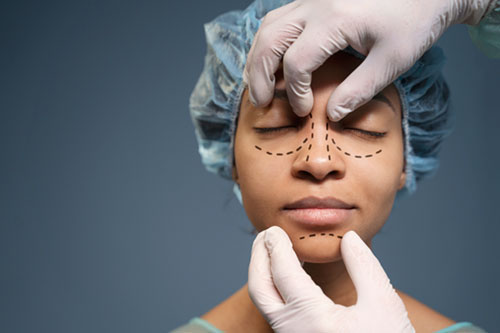Facelift Rancho Cucamonga: Smooth Wrinkles and Tighten Up Skin for a Youthful Look
Facelift Rancho Cucamonga: Smooth Wrinkles and Tighten Up Skin for a Youthful Look
Blog Article
Exploring the Emotional and Social Factors That Drive People to Think About Aesthetic Surgical Procedure as a Way of Renovation
The decision to seek cosmetic surgical treatment frequently expands beyond mere appearances, linking with psychological and social dynamics that merit complete evaluation. Factors such as self-esteem, prevalent social charm standards, and the prevalent influence of social media sites assemble to form individual inspirations for surgical improvement. As these influences end up being increasingly noticeable, understanding the underlying psychological and cultural contexts is necessary. What stays to be checked out is the profound effect these factors have not just on personal identification but additionally on wider social norms and worths bordering elegance and acceptance.
The Duty of Self-confidence
Self-esteem dramatically influences an individual's choice to seek cosmetic surgical procedure. People with reduced self-confidence commonly regard themselves in an adverse light, leading to sensations of insufficiency regarding their physical appearance.

Inevitably, the duty of self-worth in the decision-making procedure pertaining to plastic surgery highlights the complex interplay between body picture, individual fulfillment, and mental health and wellness. Understanding this partnership is important for health care specialists to make sure that patients are making informed choices rooted in reasonable assumptions and psychological well-being.
Social Appeal Standards
Influenced by prevalent media portrayals and social narratives, social beauty standards play an essential function fit people' assumptions of their own bodies. These requirements are commonly defined by an idyllic form of elegance that highlights characteristics such as symmetry, slimness, and youthfulness. As these suitables are continued with different networks, consisting of movie, advertising and marketing, and television, individuals frequently internalize these messages, resulting in discontentment with their natural look.
The implications of these societal standards prolong past visual preferences; they can influence self-worth, mental wellness, and interpersonal partnerships. Individuals that regard themselves as disappointing these criteria might experience feelings of inadequacy, motivating a wish for cosmetic surgical procedure as a way of attaining societal authorization. This search is frequently fueled by the belief that complying with these suitables will boost not just physical appearance yet additionally social standing and personal fulfillment.

Impact of Social Network
The effect of societal elegance criteria is additional intensified by the increase of social media platforms, where curated photos and idealized representations of appeal are common. Customers are constantly subjected to filteringed system and modified pictures, which typically portray unattainable physical features. This direct exposure cultivates a society of contrast, leading individuals to evaluate their very own appearance versus these usually impractical standards.
Social network influencers and celebrities regularly advertise aesthetic treatments, stabilizing the idea that surgical enhancements are a sensible means for accomplishing societal suitables (plastic surgery rancho cucamonga). The exposure of these improvements can develop an assumption that going through plastic surgery is a standard method, consequently affecting individuals to consider similar treatments as a path to improved self-worth and social acceptance
Moreover, the interactive nature visit here of social media sites enables prompt comments via likes and remarks, even more reinforcing the need to comply with popular elegance requirements. Such interactions can aggravate feelings of inadequacy and drive people towards plastic surgery as a means of obtaining validation. Ultimately, social media sites plays an essential role in forming perceptions of beauty, which significantly influences the decision-making processes bordering cosmetic surgical treatment.

Social Viewpoints on Appearance
Throughout numerous cultures, understandings of look are deeply rooted in historic, social, and financial contexts, forming individuals' views on charm and value. In several societies, appearance acts as a substantial marker of identification, influencing social standing, specialist possibilities, and personal connections. As an example, in some click this site societies, light skin is often connected with riches and opportunity, while others may idealize darker skin tones as symbols of stamina and credibility.
Moreover, traditional elegance standards are typically perpetuated via cultural stories, media depictions, and family affects, leading to varying perfects throughout various areas (plastic surgery rancho cucamonga). In Western societies, the focus on young people and physical health and fitness usually drives people toward aesthetic improvement, while in certain Eastern cultures, even more refined adjustments lined up with conventional looks might be chosen
Globalization and the spreading of digital media have better made complex these dynamics, creating a hybridization of elegance suitables that goes beyond geographical borders. As individuals significantly browse these social stories, the pressure to satisfy details appearance criteria can cause the desire for plastic surgery, reflecting a complex interplay of social values and individual ambitions. Understanding these cultural perspectives is necessary in addressing the motivations behind cosmetic surgical treatment factors to consider.
Emotional Impacts of Cosmetic Surgical Procedure
Lots of people looking for cosmetic surgical treatment record experiencing profound psychological influences that can considerably modify their self-perception and emotional health - plastic surgery rancho cucamonga. The wish for physical improvement commonly comes from underlying issues such as reduced self-confidence, body dysmorphic disorder, or societal stress concerning appeal requirements. For some, the prompt post-operative stage can lead to a momentary boost in positive self-image and complete satisfaction with their look, cultivating a feeling of empowerment
Nevertheless, these positive sensations may not be withstanding. Study suggests that while some patients experience enhanced self-esteem, others might deal with heightened anxiousness or clinical depression if their assumptions are not satisfied. This discrepancy can arise from unrealistic suitables perpetuated by media representation and social narratives surrounding beauty.
Additionally, the psychological ramifications of plastic surgery expand past the person. Relationships with friends and family might be strained as social characteristics shift, resulting in sensations of seclusion Home Page or alienation. Inevitably, the emotional impacts of plastic surgery are complex and complex, calling for careful factor to consider by both possible patients and healthcare providers to ensure informed decision-making and reasonable assumptions.
Conclusion
Finally, the choice to go after plastic surgery is dramatically affected by a combination of self-worth problems, societal beauty criteria, and social perspectives on appearance. The prevalent reach of social networks even more aggravates these stress, advertising impractical ideals that people usually aim to achieve. Comprehending these psychological and social variables is vital for resolving the motivations behind cosmetic surgery, highlighting the requirement for an extra nuanced conversation surrounding appeal and self-acceptance in contemporary culture.
The choice to go after cosmetic surgical procedure frequently extends past mere appearances, intertwining with emotional and social dynamics that merit complete exam. Inevitably, social media plays a pivotal role in shaping perceptions of beauty, which considerably affects the decision-making processes surrounding cosmetic surgical treatment.
As people significantly navigate these cultural stories, the stress to adapt to particular appearance criteria can lead to the wish for cosmetic surgical treatment, showing a complex interaction of personal aspirations and social values.In verdict, the choice to go after cosmetic surgical treatment is substantially affected by a mix of self-confidence issues, societal appeal requirements, and social perspectives on appearance. Recognizing these social and psychological variables is essential for addressing the inspirations behind cosmetic surgical treatment, highlighting the demand for an extra nuanced discussion bordering elegance and self-acceptance in contemporary society.
Report this page